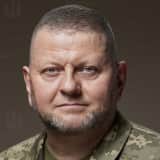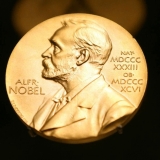Dictatorships can fight, but they always lose in the end
Today marks exactly 80 years since the liberation of one of the largest Nazi death camps, Auschwitz-Birkenau in Oświęcim. The camp was created by the authoritarian regime of a brutal dictator who wanted to rule the world but ultimately failed. But time was to show that dictators are reborn, and humanity can never be complacent.
The German-American political theorist and historian Hannah Arendt, one of the most important thinkers of the 20th century, wrote in an exploration of the origins of totalitarianism that the governmental structures created by Stalin and Hitler represented "an entirely new form of government" that was likely to reappear in various other forms in the future. She also warned that "all ideologies contain totalitarian elements".
Her words were prophetic. Exactly 67 years after Hitler became Chancellor of Germany, Putin became President of Russia on 7 May 2000.
I’m not going to describe the two very similar Olympic Games, nor will I comment on Time magazine naming both dictators as its Person of the Year 70 years apart. Without going into an in-depth analysis of the historical and social reasons that brought these murderers to power, it is undeniable that it was made possible by the fact that both German and Russian society formally consented to it.
Dr Larysa Yakubova, a corresponding member of Ukraine’s National Academy of Sciences, reasonably posits that the dictators essentially needed a population that feared even its own shadow. The inability to stand up to a totalitarian dictatorship that is taking rights and freedoms away from society leads to catastrophic consequences.
So what commonalities can we see today, in the 21st century, when the hotbed of war in the heart of Europe is taking on ever more catastrophic consequences?
In this context it’s worth mentioning that 2008 was probably too late for researchers to start drawing analogies between the two dictators in connection with the events in Georgia. That was when the Russian leadership began to cold-bloodedly carry out a plan that had long been outlined in various official documents.
It was after the war started in Georgia in 2008 that we learned that Russia has special rights in privileged zones in the post-Soviet space. The first war in Georgia was a demand for the system of international relations to be revised. If analogies are to be used, the war resembled Hitler's annexation of the Sudetenland in 1938.
European and American leaders, plunged into a whole host of other global and domestic problems, overlooked this aggression, hoping that that would be the end of it. And this, of course, gave Putin, the "gatherer of Russian lands" and "restorer of the USSR", an incentive for further annexations.
A new Russian military doctrine was proclaimed in February 2010, and a new foreign policy concept in February 2013. It clearly states that Russia reserves the right to defend the Russian population outside its territory.
The dictators, being entirely dependent on their own mental disorders, desperately needed to create a system of people dependent on and loyal to them. So, as Hannah Arendt said, loyalty to the leader then becomes the main criterion for promotion. Ambitious party members vie with each other to express their loyalty, and a cult of personality develops around the leader.
Isn't this exactly what is happening in Russia today? Are we not seeing an almighty leader today? Even if he is not particularly competent and members of his inner circle are aware of his shortcomings, they remain loyal to him out of fear that the entire power structure will collapse without him.
Arendt suggests that when totalitarian regimes come to power, they face a serious dilemma in fulfilling their promises. They solve this problem by engaging in a constant struggle with external and internal enemies – real or imagined – so that they can say that in some sense, they have not yet acquired the power to do what they promised.
In other words, totalitarian governments need to be constantly fighting enemies in order to survive. Both Hitler and Putin made use of manufactured external and internal threats for internal use and to maintain their unlimited power.
Putin, like Hitler, had spent a long time preparing his country for war, eliminating a few of his opponents and creating a powerful propaganda machine. Propaganda is the dictators’ main point of support and provides justification for constant wars. When Germany invaded Austria in 1938, it described this as "reunification". A sham referendum was held there, just as Russia did in Crimea, to legitimise the Anschluss.
Hitler then annexed the Sudetenland, explaining that this was to protect the rights of Germans living in the region. Is this not a similar situation to the start of the war in Donbas in 2014?
Nazi Germany invaded Poland in 1939; Russia launched a full-scale war in Ukraine in February 2022. Both dictators tried to present their aggression as a defence against attack. To the modern-day Führer [Putin – ed.], the existence of Ukraine within its current borders is unacceptable. In his view, a sovereign Ukrainian state could threaten Russia's geopolitical security if it was successful. This theory is still heard today, as is another one claiming that an attack on Belarus was being planned.
Of course we need more than just the facts that connect these two regimes. We need a plan for survival and victory over the dictator. But still, before I recall the end of one of them and predict the inevitable end of the other, I want to mention something else that is important if we are to understand the relationship between the two dictatorships.
As of January 2025, the war in Ukraine has been going on for almost eleven years. Its phase of full-scale aggression has been going on for two years and eleven months. In terms of casualties, duration, and the resources involved, it is not the deadliest war humanity has known. But it definitely ranks as the most brutal act of violence of the 21st century.
I do not choose the path of a historian. Our descendants will tell us a hundred years from now whether I was right to speak about the outbreak of a Third World War. But it is clear today that this war, started by a paranoid, mentally ill Führer, has every chance of taking its place alongside the most terrible events in human history. Whether or not that will be the case depends on the path that Ukraine and the whole of civilised society choose to take. That path is being chosen right now, on the battlefields of the Russo-Ukrainian war.
It’s hard to figure out which historical parallel Putin occupies today. Only one thing is clear: the war is ongoing. It is not a joke, not an accident, not a mistake or a nightmare. It’s not going to go away or blow over on its own. And like any war, it can be lost or won. It’s up to us which we prefer. In this fight against a tyrannical dictator, we need to stand together. This is a powerful enemy, and Ukraine and the entire democratic world must join forces to fight against it.
As the West hesitated from fear of crossing Putin's "red lines" and prayed to avoid escalation, China, North Korea and Iran were already uniting around Russia. The democratic countries’ delay in providing Ukraine with the weapons it needed led to a change in the situation on the battlefield – we entered a state of protracted war, the end of which is still to come. The latest technologies that have appeared on the battlefield are already becoming crucial and will change the global security of the future.
Ukrainians are fighting tyranny today, but whether this war will be limited to Ukraine alone is something the entire democratic world should be concerned about – and be taking action on!
A dictatorial regime is, of course, better suited to war. Such a regime can quickly send millions of people to dig trenches and manufacture shells and drones. Under a dictatorship, perhaps, no one would dare to evade mobilisation. Dictatorial regimes can summon up all the resources they need to wage war.
But what dictatorships cannot avoid (and history confirms this) is making fatal mistakes. When one person decides everything, there is no room for other opinions. That's why Hitler's decision to attack the USSR would later prove a fatal one. Putin's decision to attack Ukraine in 2022 will, thanks to our incredible efforts, also prove fatal.
In the war against this dictator, we don’t just need to survive. We must also develop a new strategy aimed not only at controlling the situation on the battlefield, but also at building a system of national resilience and transitioning to new technological solutions.
This war is different. That’s why the key to our Victory will be not just endurance, but a resolute and timely response to new challenges.
Glory to Ukraine!
Valerii Zaluzhnyi





